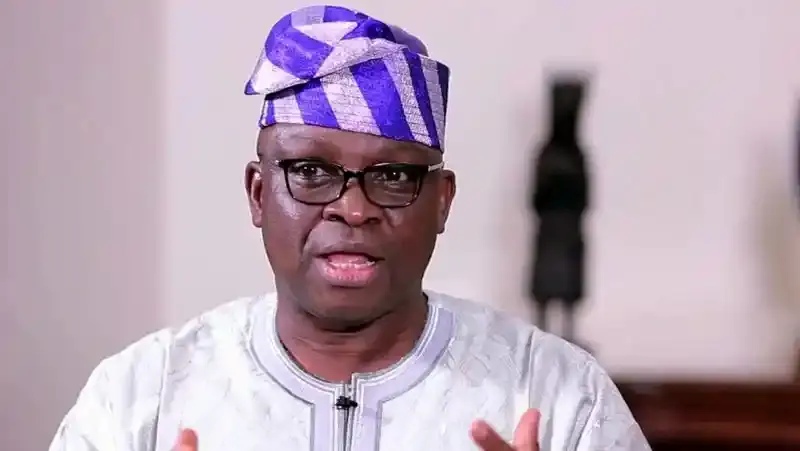On July 16, 2025, a major legal chapter in Nigeria’s recent political history came to a surprising end. The Federal High Court in Lagos cleared former Ekiti State Governor Ayodele Fayose of all charges in a ₦6.9 billion fraud and money laundering trial that had lasted for nearly seven years.
The ruling sent ripples through the country’s legal and political circles, raising eyebrows among citizens who had watched the drama unfold since 2018. The Economic and Financial Crimes Commission (EFCC), which had vigorously pursued a conviction, was left stunned.

But why did the court choose to acquit Fayose after such an intense and drawn-out prosecution? Here’s a breakdown of the six pivotal reasons that led to the collapse of the case—and why the judge ultimately sided with the former governor.
1. Lack of Direct Evidence Tying Fayose to the Money Trail
At the heart of the court’s decision was a fundamental issue: the EFCC could not establish a direct, indisputable connection between Fayose and the ₦6.9 billion in question. While the money reportedly traveled through several financial channels, prosecutors failed to demonstrate that Fayose received the funds personally or that he issued instructions for their disbursement in a way that proved criminal intent.
Without a smoking gun, the case became difficult to prosecute beyond a reasonable doubt.

2. Witness Testimonies Lacked Conviction
Justice Chukwujekwu Aneke, who presided over the case, was critical of the quality of evidence provided by the EFCC’s witnesses. Many of those called to the stand—particularly banking officials and affiliated individuals—offered vague or assumptive testimony. Their accounts were often speculative rather than rooted in hard, verifiable facts, seriously undermining the prosecution’s narrative.
In essence, the testimony failed to hit the legal threshold required to convict someone of financial crimes at this scale.
3. Key Intermediaries Were Never Prosecuted
A glaring inconsistency in the EFCC’s strategy was its decision to exclude certain central figures from direct prosecution. Most notably, Abiodun Agbele, who was allegedly instrumental in transferring the funds, was not formally charged in this particular trial.
This omission puzzled the court and weakened the overall credibility of the conspiracy argument. It became increasingly difficult to convince the court that Fayose orchestrated a complex fraud when the supposed facilitators weren’t in the dock alongside him.
4. “No Case to Answer” Motion Was Upheld
In a decisive legal maneuver, Fayose’s defense filed a “no case to answer” submission after the prosecution rested its case. The argument? The evidence presented was simply too weak to warrant a defense at all.
The judge agreed. Justice Aneke ruled that continuing the trial would serve no purpose, as the prosecution had failed to establish even the basic foundation necessary for the case to proceed. It was a damning assessment of the EFCC’s efforts, and one that effectively ended the case.
5. Absence of Testimony from Key Figures: Dasuki and Obanikoro
The EFCC had alleged that the funds Fayose supposedly received were part of a broader diversion of national security funds, traced back to former National Security Adviser Sambo Dasuki, and funneled through former Minister Musiliu Obanikoro.

However, neither Dasuki nor Obanikoro testified in court. Their absence left a significant gap in the prosecution’s case. Without their direct accounts, the chain of custody for the funds remained broken and unconvincing.
6. Political Undertones Cast a Shadow Over the Trial
Though not officially cited in the verdict, there is a strong belief among observers that the court may have viewed parts of the case as politically motivated. Fayose, known for his fiery criticism of the then-ruling All Progressives Congress (APC), has long maintained that the charges against him were rooted more in politics than in fact.
His arrest and prosecution came during a time when opposition figures were frequently targeted, further feeding the narrative that the case was more about silencing dissent than upholding justice.
What’s Next for Fayose—and the EFCC?
While the former governor can now breathe a temporary sigh of relief, the legal story isn’t quite over. The EFCC has already indicated its intention to appeal the ruling, meaning that Fayose may once again have to return to court. Still, for now, the scales of justice have tipped in his favor.

Politically, this ruling could revive Fayose’s standing within the People’s Democratic Party (PDP). As internal party dynamics shift ahead of the 2027 elections, the former governor may find new relevance, especially with his legal burdens now temporarily lifted.
For the EFCC, however, the verdict serves as a sobering reminder of the importance of meticulous prosecution and bulletproof evidence in politically sensitive trials. The Commission must now re-evaluate its strategy as it prepares to challenge the ruling at the appellate court.





